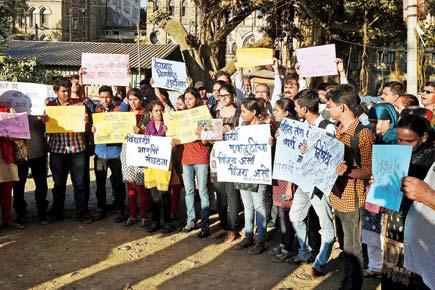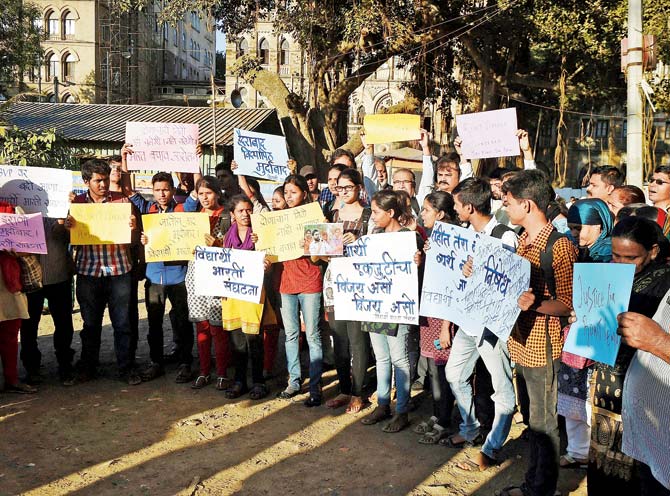At a time when the discourse in the country is full of hatred, all hope for a better future rests on the youth and their idealistic views


Mumbai students protest for Dalit rights after the death of Dalit student Rohit Vemula in Hyderbad in January. One can only hope that these brave young people will develop their idealistic views as they move into adulthood. Pic/AFP
 Some years ago, on World Aids Day (December 1 every year), I was asked to judge a debate on the subject of HIV/Aids by a prominent Mumbai hospital. The school children who took part had done their research well — both of scientific advances and changing moral positions on the disease. They looked at HIV/Aids from outside the prism of blaming the victim and taking a stance for “morality” and instead concentrated on the health and social issues which needed to be addressed.
Some years ago, on World Aids Day (December 1 every year), I was asked to judge a debate on the subject of HIV/Aids by a prominent Mumbai hospital. The school children who took part had done their research well — both of scientific advances and changing moral positions on the disease. They looked at HIV/Aids from outside the prism of blaming the victim and taking a stance for “morality” and instead concentrated on the health and social issues which needed to be addressed.
ADVERTISEMENT
The odd note in fact came from one of my fellow judges, a well-known Mumbai doctor. He said that in his experience, the HIV virus had spread ever since women left home to work and had become “promiscuous”. The school children looked shocked and confused. And finally, it took the director of the hospital, also a doctor, to settle the dispute by striking a note of reason rather than personal belief.
This was some years ago and who knows how many other people tried to corrupt those open-minded school children since then. At that age, they were arguing against prejudice and against attaching labels to people for no fault of theirs.
These were not issues that were not really discussed when I was in school in the 1960s and 1970s. Sensitivity and political correctness had not yet entered our lives and much was swept under the carpet. We did have mandatory “moral science” classes which usually led to us doing our homework or everyone, including the teacher, having a little nap. The most moral of issues as I remember it, was ensuring that taps were shut after using them — a lesson which no one seems to have learnt if you look around you today.
I was pleasantly shocked last week, at another inter-school debate in Dehradun. This competition was on a large scale with schools from within Doon as well as from Jaipur, Indore, Mussoorie participating. Two compelling subjects were transgender rights and reservations for transgenders and whether social media freedoms should be curbed or not. Both topics were on point as far as the larger discussion in India are concerned and all the debates and debaters showed that these school students were decades ahead of the rest of the population when it came to lack of bias and prejudice.
No doubt, the home and the school must provide some environment for free thought and deeper understanding of social issues. But in these specific cases, the main preparation was done an hour before the debates, with no access to the Internet and no contact with their teachers. Some of the viewpoints therefore would have come from the students themselves.
One of the schools arguing against reservations for transgenders asked me for some “tips” for their next debate. I gave them a few arguments that they could have used to bolster their case. “The thing is, ma’am,” one girl laughed, “We agree with the argument that transgenders need reservations.” It was a bit eye-opening for me because the general perception is that middle class India is steadfastly against reservations.
The word “merit”, incidentally, was not used in this debate and the arguments against reservations focused on the fact that social prejudice still remains against the Dalits, the Scheduled Tribes and Other Backward Castes.
Social media freedoms got the biggest response from debaters and the audience. The issue of freedom of expression and free speech appeared to have been taken very seriously. The applause almost stopped the clock when one speaker brought up the dangers of calling everyone “anti-national”! These are 15- and 16-year- olds, and they seem to understand our Constitutional rights much better than many adults.
The idea that censorship is for the good of the general public was also dismissed by students in the audience.
It is possible that I am reading too much into this. It is also possible that I feel like this because the current discourse in this country is so full of hatred and bias and zealous rage. One can only hope that these brave young people will develop their idealistic views as they move into adulthood and out into the cruel world that awaits them. Many quoted Rabindranath Tagore’s exhortation that the clear stream of reason is being lost in the dreary desert sand of
dead habit.
A good reminder to us of what we are losing in our hatred.
Ranjona Banerji is a senior journalist. You can follow her on Twitter @ranjona
 Subscribe today by clicking the link and stay updated with the latest news!" Click here!
Subscribe today by clicking the link and stay updated with the latest news!" Click here!







